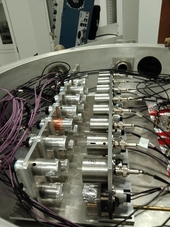Scientific supervisor
| Name | Dr hab. Andrzej Wieloch |
| Email: | andrzej.wieloch@uj.edu.pl |
| Department | Department of Hot Matter Physics |
| Laboratory | Microelectronics |
| Group webpage |
Short description
One of the important methods of searching for long-lived exotic nuclei is to study the decay of radioactive elements produced in materials that have been irradiated (with virtually unmeasurable activity) in a cyclotron. Such nuclei may represent as yet undiscovered super-heavy elements, but also long-lived isotopes of known elements.
The laboratory has a system of silicon detectors and scintillation detectors that enable the registration of the decays of interest to us in materials obtained from the cyclotron in the USA.
The benefits for the students during the internship are:
- getting acquainted with the basic techniques of particle detection in nuclear physics;
- acquiring the ability to use the ROOT package commonly used in nuclear physics and elementary particle physics for an analysis of experimental data;
- co-authorship in a publication in a reputable journal if the obtained results are interesting.
Silicon detectors (right) and scintillation detectors (left) mounted in a vacuum chamber.
Main research tools
- Silicon and scintillation detectors
- ROOT package for data analysis
Additional requirements to the candidate
- Linux basics (very helpful)
- basics of c ++ programming (helpful)
- elementary knowledge about the decay of radioactive elements (it will be useful)
Possibility to continue student internship in the form of:
- Diploma thesis (master's or bachelor's degree): Yes
- PhD study: Yes

